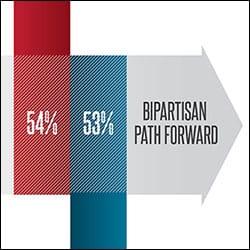Post-Shutdown Poll: Majority of Democrats and Republicans Would Support Policies They Disagree With In Order to Achieve a Long-term Fiscal Solution
Peter G. Peterson Foundation poll finds voters urge bipartisanship on fiscal solutions to avoid risking serious damage to the economy
54% of Republicans say they would accept revenue increases, and 53% of Democrats would accept entitlement reforms as part of a comprehensive plan on
the national debt
88% of voters say it is important for the bipartisan committee set up by the recent budget compromise to focus on a longer-term fiscal plan to reduce the national debt
NEW YORK — Following the recent government shutdown and debt ceiling standoff, and as the Budget Conference Committee gathers, a new poll released today finds that a majority of voters in both parties are willing to give ground on key issues in order to achieve a much desired, long-term fiscal solution. The poll, commissioned by the Peter G. Peterson Foundation, shows that 54% of Republicans would be willing to accept revenue increases, and 53% of Democrats would be willing to accept entitlement reforms, as part of a comprehensive plan to stabilize our long-term debt.
Voters agree on the importance and urgency of finding fiscal solutions in order to foster economic growth. Ninety percent of voters believe that Congress’ inability to enact a long-term fiscal plan creates uncertainty about the future and has serious consequences for our economy. Ninety-four percent agree that Congress needs to reach a long-term plan to deal with our national debt instead of relying on short-term fixes in times of crisis. As the Budget Conference Committee convenes, set up by the recent agreement, 89% of voters say it is important for the Committee to focus on a longer-term fiscal plan to reduce the national debt.
The Impact of Governing by Crisis
Click here for full topline poll results
Click here for the infographic
Nearly universally, voters agree that they would like to see Democrats and Republicans work together to solve the country’s long-term fiscal and economic problems (95% Total/96% Democrats/97% Republicans).
Michael A. Peterson, President and COO of the Peterson Foundation, said “Despite Congress’ inability to reach bipartisan compromise, a majority of Americans in both parties are willing to agree to difficult policy changes to achieve a long-term plan on our national debt. As the Budget Conference Committee convenes in Washington today, nearly 90% of Americans are urging them to focus on a longer-term fiscal plan. The Committee should use this opportunity to put America’s fiscal and economic future above politics, and move our great nation past these short-term fire drills once and for all.”
Key Findings
On the recent shutdown:
- Seventy-nine percent of voters say that the shutdown had an impact on the United States’ place in the world; 77% say that it damaged the future outlook of the national economy; and 70% believe that the shutdown had an impact on everyday Americans.
On the need for a long-term fiscal plan:
- Ninety-four percent of voters agree that Congress needs to devise a long-term plan to address our national debt instead of relying on short-term fixes in times of crisis (83% strongly agree).
- Ninety percent of voters agree that Congress’ inability to enact a long-term fiscal plan creates uncertainty about the future and has serious consequences for our economy, with many believing that the fiscal policymaking process in Washington is broken (86% agree, 71% strongly agree).
- Fully 89% of voters say it is important (55% extremely important) for the bipartisan committee set up by the recent budget compromise to reach an agreement on the 2014 budget and an equal number (88%/57% extremely) say they must also focus on a longer-term fiscal plan to reduce the national debt.
On bipartisanship:
- Nearly universally, voters agree that they would like to see Democrats and Republicans work together to solve the country’s long-term fiscal and economic problems (95% Total/96% Democrats/97% Republicans)
- Voters are willing to do their part to encourage a bipartisan solution. A majority of Republicans (54% agree) say they would support a long-term solution on the national debt, even if it includes revenue increases they disagree with, and a majority of Democrats (53% agree) say they would support a long-term solution on the national debt, even if it includes entitlement reforms they do not agree with.
See full poll results here.
Methodology
The Peter G. Peterson Foundation commissioned the poll by the Global Strategy Group to survey public opinion on the national debt. The nationwide poll included 1,019 U.S. registered voters, surveyed by telephone between October 21 and October 24, 2013. The poll has a margin of error of +/- 3.1%. The poll examined voters’ opinions on the national debt, political leadership, and America’s fiscal and economic health.
About the Peter G. Peterson Foundation
The Peter G. Peterson Foundation is a nonprofit, nonpartisan organization established by Pete Peterson — businessman, philanthropist and former U.S. Secretary of Commerce. The Foundation is dedicated to increasing public awareness of the nature and urgency of key long-term fiscal challenges threatening America’s future and to accelerating action on them. To address these challenges successfully, we work to bring Americans together to find and implement sensible, long-term solutions that transcend age, party lines and ideological divides in order to achieve real results. To learn more, please visit www.pgpf.org.
Further Reading
What Are Refundable Tax Credits?
The cost of refundable tax credits has grown over the past several years, with the number and budgetary impact of the credits increasing.
The Six Largest Corporate Tax Expenditures
Relative to the size of the economy, the U.S. collects less revenues than many other advanced countries. Tax breaks are a contributing reason.
What’s the Difference Between the Trade Deficit and Budget Deficit?
The terms “budget deficit” and “trade deficit” can be conflated, but they are distinct measurements of important fiscal and economic concepts.




